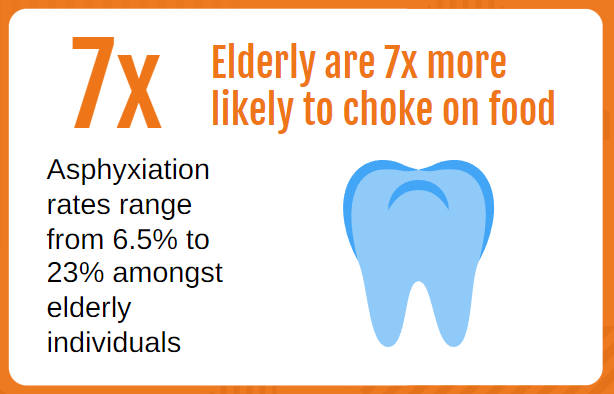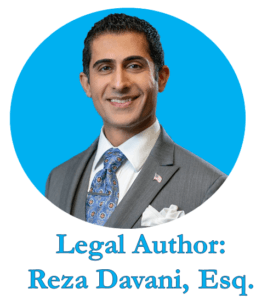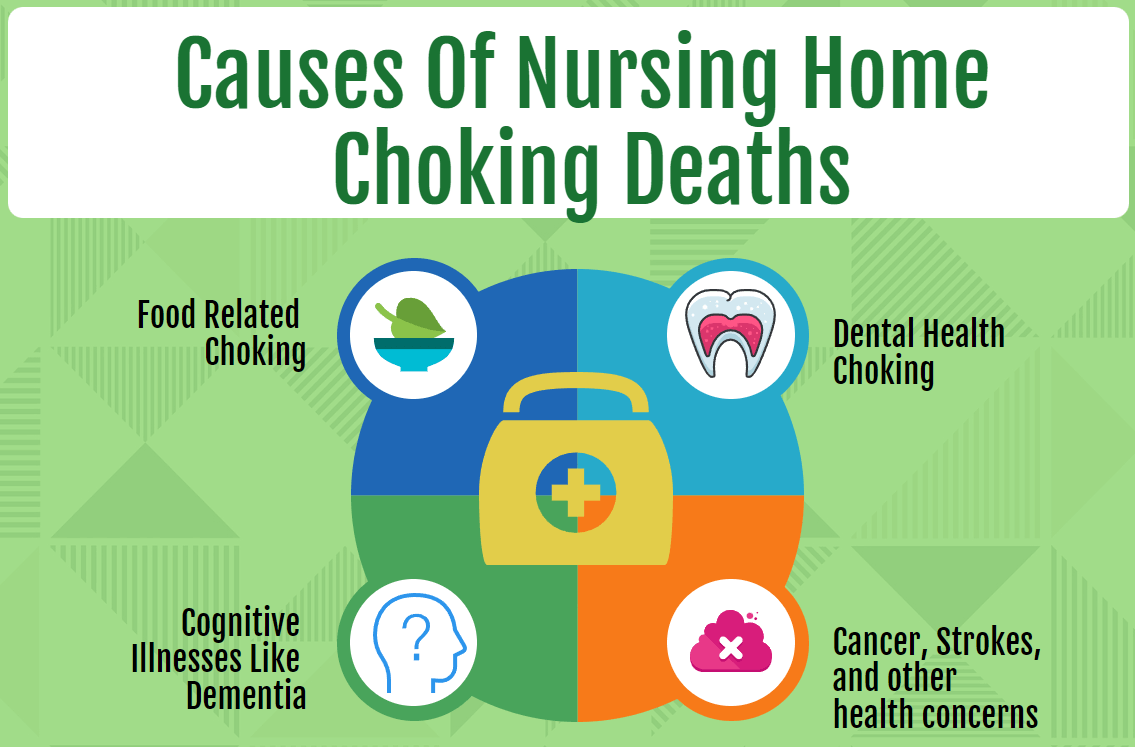Article Updated: April 25, 2022
Nursing Home Choking Deaths in Elderly
Based on my experience, a great portion of the time that a nursing home resident dies as a result of choking, it happens while they are eating. Almost all of the time, that results from poor care planning or failure to follow through with the intent of the car plan that the nursing home made, or was supposed to make, to protect the nursing home resident from choking dangers and possible death.
Having handled over 500 nursing home injury investigations, I am very familiar with these types of claims. If the choking resulted in death, you have a wrongful death claim on top of the deceased resident’s personal injury claim.
Read my article below to learn more. When you are ready for a free consultation, I invite you to call me day or night.
Clickable Table of Contents
Nursing Home Choking Deaths
1 – Causes of Choking In The Elderly
2 – Rates Of Elderly Choking On Food
3 – Nursing Home Choking Deaths
4 – Q&A On Risks Of Choking Deaths In The Elderly
5 – Get Help With Your Nursing Home Choking Death Case
Resources
6 – Supporting Literature, Citations & Research
7 – About the Author
8 – Legal Help in Maryland & Nationally
Causes of Choking In The Elderly
The elderly are at a higher risk of choking than nearly any other demographic. Choking can be a stressful event in any individual’s life and for the elderly there is always the additional risk that they can can die from any choking event.
The reasons for the increased risk are not only related to food being swallowed incorrectly, but also additional causes including:
◊ Acid reflux
◊ Cancer of the mouth
◊ Alzheimer’s
◊ Dementia
◊ Poor oral health
◊ Cancer of the throat or esophagus
◊ Stroke
As the risk for these conditions increases over time with age, so does the increased risk in choking deaths in the elderly as well.
Risks Of Choking In The Elderly Increases Over Time
The risk of choking only gets worse over time for the elderly as many of the conditions that cause choking get worse.
When their health deteriorates there is a higher chance that conditions like cancer can increase the risk of choking.
When individuals for example have cancer of the throat it can impact how they swallow and what they can eat or drink.
As the cancer progresses so does the chance that they can have a mishap that can cause them to choke to death.
The same can be said of cognitive conditions that only get worse over time.
When an individual has less function with their cognitive abilities they will also have a higher chance of asphyxiation related to simple acts like drinking a glass of water.
Causes of Choking In Elderly: Chronic Illnesses
Many chronic illnesses cause there to be difficulty with eating and drinking. The ones that impact the elderly the most are cancers that impact the digestive and throat systems and cognitive illnesses like Alzheimer’s disease and dementia.
Digestive conditions such as colitis and Crohn’s can also add to the problems faced with choking hazards.
Chronic illnesses also often require many medications to be taken which cause dehydration and dry mouth.
Dry mouth can also cause there to be higher choking hazards for the elderly.
Even solutions that are used to help with dry mouth and stimulate saliva production like keeping hard candy in the mouth causes an increase in choking hazards.
Ultimately chronic illnesses both directly cause an increase in asphyxiation threats and indirectly because of medications and other efforts that address the illness.
Causes of Choking In Elderly: Dental Risks
Dental risks are often the reason for the elderly choking on food. Many elderly individuals will need full or partial dentures because of tooth loss.
This loss of tooth is directly linked to heightened risk of choking in the elderly.
A nursing home study found that a large portion of asphyxiation cases were found to be linked to insufficient occlusal support due to tooth loss.
Despite attempting to make changes to diet to accommodate loss of tooth, such as selecting soft foods to eat, loss of dentition and fatigue from chewing leads to choking risks being increased.
Poor dental status is highly associated with increased choking risk in aging people and the condition is worse for many because they are not even aware of the links between their oral health and their choking risks being increased.
People over the age of 65 have a seven time higher risk for choking on food than even children aged 1–4 years of age and a big reason for this is tooth loss and denture use.
Rates Of Elderly Choking On Food
In the time period between 2007 and 2010 over 2000 individuals over the age of 65 died due to choking on food.
The rates of this problem are even higher when choking on water are also included in these figures.
The biggest increases in choking on food are caused by three conditions: dementia (including Alzheimer’s disease), Parkinson’s disease and pneumonitis.
The rates of people choking are also impacted by the people who help to care for the elderly.

Another increase in the risk comes from many elderly choosing to eat without their dentures in which causes them to swallow food without chewing properly.
The risks of choking in the elderly are often very high in some individuals because of the combination of multiple risk factors at once.
There is a high prevalence of the elderly choking on food because they have dentures and also have conditions like dementia at the same time.
The more variables that exist at once, the higher the rates of choking in the elderly.
Causes of Choking In Elderly: Elderly Choking on Food
Aging and weakening of the muscles coupled with a less coordination increase the risks of choking in the elderly and requires careful oversight when they are eating.
Many aging individuals do not have this supervision which is one of the causes of choking in elderly people.
However, even with supervision the numbers can be high when care home employees are not careful when giving food to individuals.
Choking deaths are high even in individuals in nursing homes exactly because there is not enough care put into what they are given to eat.
Choking on food leading to death has been found in anywhere from 10%-25% of individuals in nursing homes residents alone.
Elderly individuals who live alone or have no one to assist them with eating have an even higher rate of this problem.
The elderly choking on food is therefore a much bigger and more serious problem than many are aware of.
The many causes of choking in the elderly only increases the chances that food becomes a potential source of danger.
Nursing Home Choking Deaths
Elderly death by choking on food in nursing homes is higher than it should be. When an individual is in a nursing home there is the expectation that they are in a safe place and they are going to be fed in a secure manner.
Despite this being the expectation, every year hundreds of individuals do in fact die in nursing homes due to choking on food and water.
When this happens it is a clear example of neglect on the part of the nursing home and its employees.
Risk of Choking Death In The Elderly: Alzheimer’s and Dementia
One of the biggest risks of choking in the elderly comes from the presence of cognitive disorders.
In any given years it is possible to find as high many as 76,543 deaths for which the death certificates report choking as a cause of death and thousands of them are food-related choking deaths.
Parkinson’s disease and Alzheimer’s disease are responsible for a majority of those deaths.
Cognitive issues like dementia impacts the part of the brain that has control over things like swallowing.
When the dementia advances the ability to swallow diminishes or the swallowing capability becomes weakened not allowing the individual to eat or drink safely.
This condition is known as dysphagia and it can be painful and even make swallowing impossible for some people.
This condition tends to be more prominent in those who are experiencing late-stage decline which makes it harder for them to communicate at all which makes choking even more possible.
Cancer Increases Nursing Home Choking Deaths
Cancer is another condition that can make swallowing food or liquids very difficult for an individual.
Cancer itself can cause there to be weakening of the muscles in the neck and throat and even cause disruption in the normal functions of the whole digestive system.
Even the treatments for cancer can lead to higher rates of choking death.
Cancer treatments include medications that can make the mouth drier which leads to higher risk of swallowing problems.
In addition to this some treatments cause stiffness and scarring in the throat and mouth which makes swallowing harder.
Medications and treatments for cancer can also cause infections of the mouth or esophagus which again lead to difficulty in swallowing.
In advanced cases of cancer there will be an increased difficulty in this swallowing problem and as the difficulties increase, so do the risks of death.
Q&A On The Risks Of Choking In The Elderly
What is the highest cause of choking death in nursing homes?
In nursing home residents the highest causes of choking death comes from cognitive illnesses and lack of proper oral health conditions. These both lead to many individuals having a harder time with swallowing food and drinks which can lead to death.
Do cognitive illnesses make the chance of choking death higher?
Yes, cognitive illnesses increase the chances of choking death in a big way. Cognitive issues cause weakening of the muscles in the throat and also impact the part of the brain that influences swallowing.
Are there choking prevention guidelines in nursing homes?
Nursing homes should have in place clear rules and guidelines to ensure that those with eating and drinking problems or cognitive issues are given only specific kinds of foods and are also monitored carefully to reduce the chances of death due to choking.
If there is an elderly death by choking on food in a nursing home can I pursue a lawsuit?
If a loved one of yours died due to choking while living at a nursing home you do have legal recourse to recover losses caused by this loss. Allowing a resident to choke to death in a nursing home is an act of negligence and is a dereliction of duty on the part of the nursing home and its staff.
How frequent are choking deaths in the elderly due to food?
Choking deaths in the elderly because of food is a big problem that causes thousands to due every single year.
What stage of cancer and dementia is dysphagia common in?
In later stages of cancer and chronic illnesses like dementia there is usually more difficulty with swallowing. Dysphagia is therefore much higher in more advanced stages of many illnesses.
Get Help With Your Nursing Home Choking Death Case
Risks of choking in the elderly are related to many illnesses and causes that nursing homes should be prepared for. If your loved one has died due to choking, you have grounds to bring a lawsuit against the nursing home and its staff for negligence.
What you need more than anything in situations like this are answers and someone to listen to your specific situation.
With years of experience with cases involving nursing homes and wrongful death claims, I welcome you to contact me at any time for a free consultation. Call, email, or fill out the contact form below for help.
Warmly,
Reza Davani, Esq.
State Bar No.: 1212110211
Federal Bar No.: 30168

Supporting Literature, Citations & Resources:
Kennedy, B., Ibrahim, J. E., Bugeja, L., & Ranson, D. (2014). Causes of death determined in medicolegal investigations in residents of nursing homes: A systematic review. Journal of the American Geriatrics Society, 62(8), 1513-1526.
Kramarow, E., Warner, M., & Chen, L. H. (2014). Food-related choking deaths among the elderly. Injury prevention, 20(3), 200-203.
Cichero, J. A. (2018). Age-related changes to eating and swallowing impact frailty: Aspiration, choking risk, modified food texture and autonomy of choice. Geriatrics, 3(4), 69.
Kikutani, T., Tamura, F., Tohara, T., Takahashi, N., & Yaegaki, K. (2012). Tooth loss as risk factor for foreign-body asphyxiation in nursing-home patients. Archives of gerontology and geriatrics, 54(3), e431-e435.
Wu, W. S., Sung, K. C., Cheng, T. J., & Lu, T. H. (2015). Associations between chronic diseases and choking deaths among older adults in the USA: a cross-sectional study using multiple cause mortality data from 2009 to 2013. BMJ open, 5(11), e009464.
About the Author
This nursing home and medical malpractice article was written by Baltimore, Maryland nursing home attorney Reza Davani, Esquire. Mr. Davani received his Juris Doctor degree from a Tier 1 law school, the University of Maryland Francs King Carey School of Law. He received his first license to practice law from the State of Maryland’s Court of Appeals (MD State License No. 1212110211), and just four months later received a federal law license from the United States District Court for the District of Maryland (Federal License No. 30168).
Mr. Davani has been practicing law for over 10 years. He began practicing law by helping clients as a sanctioned student lawyer before receiving his law license, and second chaired his first jury trial in federal court before even graduating law school. He is a registered member of the Maryland Association for Justice (MAJ), the American Bar Association (ABA), the American Association for Justice (AAJ), and was formerly on the MAJ’s Legislative Leader’s Circle.
Mr. Davani has taken over 20 cases to trial in state and federal court, and favorably settled well over 100 cases for injured victims. He has personally helped his clients recover over $15,000,000 in personal injury, medical malpractice, and nursing home abuse settlements and verdicts in Maryland and other states. He is dedicated to fighting for justice, and welcomes the opportunity to help you.
Nursing Home Choking Death Lawyer Near You in Baltimore, Maryland & Beyond
I can help you anywhere in Maryland, including Allegany County, Anne Arundel County, Baltimore City, Baltimore County, Carroll County, Calvert County, Caroline County, Cecil County, Charles County, Dorchester County, Frederick County, Garrett County, Harford County, Howard County, Kent County, Montgomery County, Prince George’s County, Queen Anne’s County, Somerset County, St. Mary’s County, Talbot County, Washington County, Wicomico County, and Worcester County.
I have helped clients in over a dozen jurisdictions, including California, Delaware, District of Columbia, Georgia, Illinois, Iowa, Massachusetts, Maryland, Mississippi, New Jersey, New Mexico, New York, North Carolina, Pennsylvania, South Carolina, Washington, and Virginia.
I help injured victims nationwide in all 50 states on a case-by-case basis via Pro Hac Vice.




